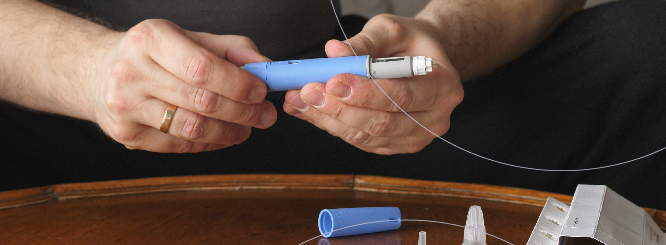
If you’ve been keeping an eye on diabetes treatments or weight loss solutions, you’ve likely heard of Ozempic. This medication has garnered attention not only for its effectiveness in managing blood sugar levels but also for its potential benefits in weight loss. But what exactly does Ozempic do? How long can you stay on it, and what are the possible downsides? Let’s dive into these questions and more.
What Does Ozempic Do for Diabetics?
Ozempic, known generically as semaglutide, is a medication designed to help manage type 2 diabetes. It works by mimicking a hormone in your body called GLP-1 (glucagon-like peptide-1). This hormone helps to regulate blood sugar levels by stimulating insulin secretion and inhibiting glucagon release.
When you take Ozempic, it helps your pancreas produce more insulin when your blood sugar levels are high, making it easier to keep your blood sugar in a healthy range.
But that’s not all. Ozempic also slows down the digestion process, which means that sugar from the food you eat is absorbed more slowly into your bloodstream. This dual action helps to prevent the spikes in blood sugar that are common after meals.
Delving Deeper: Ozempic Side Effects
Ozempic has gained popularity not only for its efficacy in managing type 2 diabetes but also for its potential in aiding weight loss. However, like any medication, it’s essential to be aware of its potential side effects, modes of administration, and long-term use implications.
Ozempic Side Effects
While Ozempic is effective in controlling blood sugar levels, users should be aware of possible side effects. Common Ozempic side effects include nausea, vomiting, diarrhea, and constipation. These symptoms often subside as your body adjusts to the medication. However, more severe side effects can occur, such as pancreatitis, which presents with severe abdominal pain, nausea, and vomiting. Other serious side effects might include changes in vision and kidney problems. It’s crucial to discuss any persistent or severe side effects with your healthcare provider to ensure the medication is safe for you.
The Downside of Ozempic
Like any medication, Ozempic comes with potential side effects. Some common Ozempic side effects include nausea, vomiting, diarrhea, and constipation. These symptoms are usually mild and tend to improve over time as your body gets used to the medication.
However, there are some more serious side effects to be aware of, such as pancreatitis (inflammation of the pancreas), changes in vision, and kidney problems.
It’s important to talk to your doctor about any side effects you experience, especially if they are severe or don’t go away.
Another downside to consider is the cost. Ozempic can be expensive, especially if your insurance doesn’t cover it. It’s worth checking with your insurance provider to see what options are available to you.
How Long Can You Stay on Ozempic for diabetes?
Ozempic is designed for long-term use when having diabetes. As long as it continues to be effective in managing your blood sugar levels and you don’t experience any serious Ozempic side effects, you can stay on Ozempic indefinitely. However, regular check-ins with your healthcare provider are essential. They will monitor your progress and make any necessary adjustments to your treatment plan.
What Does Ozempic Do to Your Organs?
Ozempic’s primary target is the pancreas, where it stimulates insulin production. However, its effects are felt throughout the body. By slowing down the digestive process, it impacts the stomach and intestines. Additionally, because it helps to lower blood sugar levels, it can reduce the strain on your kidneys over time. There’s also evidence that Ozempic may have cardiovascular benefits, such as reducing the risk of heart attack and stroke in people with type 2 diabetes.
However, it’s important to note that Ozempic can potentially cause pancreatitis, a serious condition where the pancreas becomes inflamed. Symptoms of pancreatitis include severe stomach pain, nausea, and vomiting. If you experience these symptoms, it’s crucial to seek medical attention immediately.
Ozempic Weight Loss
One of the most talked-about benefits of Ozempic is its potential for weight loss. While Ozempic is not a weight loss medication per se, many people who take it for diabetes management find that they lose weight as a side benefit. This weight loss is likely due to a combination of factors, including reduced appetite and slower stomach emptying, which helps you feel fuller for longer.
In fact, Ozempic weight loss has been studied specifically in people without diabetes, and the results have been promising. Many participants in these studies experienced significant weight loss, which has led to growing interest in Ozempic as a weight loss aid. However, it’s important to use Ozempic under the guidance of a healthcare provider, as it is primarily a diabetes medication.
Ozempic Injection vs Ozempic Pills
Currently, Ozempic is available as an injection. The Ozempic injection is typically administered once a week, making it a convenient option for many people. There’s ongoing research into oral versions of semaglutide (the active ingredient in Ozempic), which could offer an alternative for those who prefer not to use injections. However, as of now, the injection form is the standard.
Ozempic offers a promising option for people with type 2 diabetes and those looking for an effective weight loss aid. It works by helping to regulate blood sugar levels and offering the added benefit of weight loss for many users. However, like any medication, it’s important to be aware of the potential side effects and to use it under the guidance of a healthcare provider.
There is ongoing research into developing oral versions of semaglutide (the active ingredient in Ozempic). Ozempic pills could offer an alternative for those who prefer not to take injections. However, as of now, the injection form remains the standard.
Contact Us to Learn More
If you’re considering Ozempic, talk to your doctor about whether it’s the right choice for you. And if you’re looking for support in managing your diabetes or achieving your weight loss goals, the team at LIMARP is here to help. With comprehensive treatment plans tailored to your individual needs, we’re committed to helping you achieve better health and well-being.
If you’re ready to take control of your health and diabetes, explore how Ozempic or other treatments can help you, contact LIMARP bariatric clinic in Tijuana, Mexico. Reach out online anytime or call us at (619) 373-0229 to schedule your consultation and start your journey to better health today.


